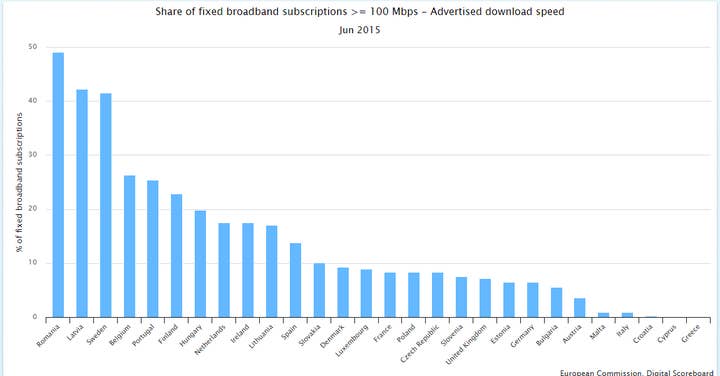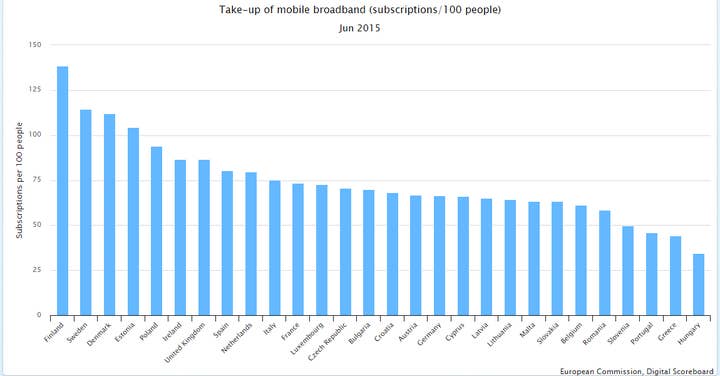The future of the European games industry is written in the telecom regulations
Jari-Pekka Kaleva examines the impact of EU negotiations
Without a good telecommunication infrastructure, there would not be a European games industry. Without a balanced European telecommunication regulation, there would be a much smaller European games industry.
Year by year, the games industry is relying more and more on telecommunication networks. The first major online multiplayer PC games were introduced about 25 years ago. Now even casual single player mobile games require a constant server connection to operate. 20 years ago it was enough to provide sufficient download speeds. Now people are streaming themselves while playing games, and by doing so they are pushing the limits of upload speeds. In a not so distant future we will see the next generation of cloud gaming solutions once again motivating people to invest in faster Internet connections.
Game developers tend to take network infrastructure for granted and it is easy to forget that both the quality and data prices vary significantly between countries. While countries like South Korea are already introducing 1Gb Internet connections, European countries are struggling to reach 100Mb level. Thus differences in network infrastructure and business models are becoming an increasingly important factor determining the possibilities and limitations of different market areas.
To Romania for quick broadband connection, to Finland for unlimited mobile data
It is a common mistake to think that the level of broadband and mobile infrastructure are the same in all European countries. It is equally misleading to think that old members states would have a better network infrastructure than new members states.
In 2015, more than 40% of fixed broadband subscribers in Romania, Latvia and Sweden had at least 100mb connection. The big member states fell far behind them. Only 13.8% of the broadband subscriptions in Spain and less than ten percent in France, Poland, the UK and Germany had at least 100mb connection speeds.

The same applies to mobile data. In 2015, Finland had 139 mobile broadband subscriptions per 100 people, Germany only 66. In 2016, unlimited mobile data plans are reality in some Member States like Ireland (€29.59/month), Finland, Lithuania, Latvia, Poland and Denmark (15,47€/month). In Finland unlimited data plans have been the norm for years and, as its example demonstrates, it is possible to reach a market balance where unlimited data for everyone is a sustainable business model.

Sadly few other European countries are moving in the same direction. An unlimited data plan in Germany, for example, costs 199,95€/month and therefore consumers are forced to resign themselves to 6GB for €26.49. In France, a subscriber gets 60GB of mobile data for €29.99, in the UK 30GB for €28.56.
The long legacy of public telecommunication monopolies
The European telecommunication framework is fragmented for historical reasons. Until the late 1980s and mid 1990s telecommunication operators in Europe were usually public monopolies. In order to provide lower prices and better quality of service, European Union decided open the telecommunication markets for competition by privatizing telecommunication operators and giving alternative operators' access to the fixed networks of incumbent operators.
Although European competition authorities have been successful fighting anticompetitive market practices, many of the big telecommunication operators in Europe today are direct successors of the old national operators. Like in the 1980s, they are still operating mainly on national level. Consequently, unlike in the USA, pan-European telecommunication markets do not really exist.
Thus for a game developer there is no digital single market area for the most data hungry novel technological solutions. Instead, the new solutions can first be introduced in smaller member states in Eastern and Northern Europe with sufficient telecommunication infrastructure before being slowly introduced in big Member States, usually in big cities with the quickest broadband connections.
Game developers at the mercy of telcos
The fragmented nature of European telecommunication infrastructure is not the only way telecommunication operators have been hindering the development of European games industry.
Since the introduction of massive multiplayer online games in the late 1980s and early 1990s, online game developers have been afraid of telecommunication operators trying to either block or throttle the consumer access to their games. Unfortunately, these fears were justified. In 2011, Canadian telecommunication operator Rogers admitted that it was throttling access to online games. In 2012, EU Telecom regulators found out that European telecommunication operators had been blocking voice-over-IP services like Skype.
"The debate on the future of network neutrality is the debate on the future of games industry"
Consequently, the debate on the future of network neutrality is the debate on the future of games industry. If telecommunication operators are allowed to provide a fast line for mobile and online game publishers paying extra service fees and slow down all other traffic, it will quickly lead to a situation where the market access will be once again nominated by big usually non-European entertainment conglomerates with bottomless pockets to purchase paid priority status for their traffic. This would create a significant market access barrier for all European SMEs trying to enter the digital markets and significantly cut down the revenue share of the self-publishing European content creators.
Luckily, in 2015, European Parliament and European Council reached an agreement on EU wide rules on network neutrality. Although these new rules include some alarming loopholes, in general they provide a much more stable market environment for the quickly crowing European digital industries.
Affordable data plans and network neutrality pave the way for the future or European mobile game markets
One of the most worrisome loopholes of the new regulation allows so called “zero rating”, where telecommunication operators are allowed to decide not to count certain sites or applications against data limits. This particularly problematic for mobile games, where unlimited mobile data plans are far from a norm in Europe.
It will be up to member states to decide, if they are going to introduce this loophole in their regulation or not. For example, in Sweden zero ratings were allowed and it did not take long for Facebook to reach a deal with a leading telecommunication operator, Telia, for zero rating for their services. If this loophole is not closed, for example Niantic could use their enormous war chest to exclude Pokémon Go and their upcoming augmented reality games from data plans. This would create a significant market access barrier for all other companies into the emerging Swedish mobile augmented reality markets.
This would not be the first time the restrictions on the use of mobile data are hindering the development of the European games industry. European game developer studios started to co-operate with European telecommunication operators at the turn of the millennium, when the first downloadable mobile games were launched in then operator run national application stores. However, due to the lack of affordable data plans, the first generation mobile games were poorly able to fully exploit the full possibilities of mobile devices for gaming, e.g. game analytics.
"European game developer studios started to co-operate with European telecommunication operators at the turn of the millennium, when the first downloadable mobile games were launched"
The same happened again in the early 2010s, when the lack of affordable data plans for consumers was one the factors behind the failure of the mobile location based games. Now, the lack of unlimited data plans is not just hindering the development of European games industry, it is becoming one of the biggest obstacles hindering the European appeconomy in general.
Only regulators are able to push Europe from a megabit to gigabit society
Although especially Northern and Eastern Member States are taking steps forward, it is likely that 1Gb connections and affordable unlimited mobile data will not be introduced on the European level without a push from European policy makers.
Unfortunately, the European Commission's Connectivity for the European Gigabit Society strategy falls short from its ambitious name. The strategy plans to offer gigabit connectivity only for the main socio-economic drivers meaning, for example, schools, libraries and health centers. For European households, the strategy aims at offering an access to at least 100 Mbps broadband connectivity and an uninterrupted 5G mobile coverage for all urban areas and major terrestrial transport paths.
For example, in Germany, with current mobile data prices a 10Gbps 5G connection would cost 44,15€ per second at full speed with a normal mobile subscription. Without affordable unlimited mobile data plans and 1GB broadband connections, data prices and poor network infrastructure will become the key factors hindering the development of the data driven society.
The debate on the future of mobile data prices and telecommunication infrastructure has already started
Earlier this year the European Parliament and Council decided to end roaming charges for consumers in the European Union by June 15th 2017. From that date on, the consumers should be able to use their mobile data like at their own country when travelling in Europe. However, the decision did not abolish inter-operator roaming charges and their future is currently being debated between the Parliament and the Council.
"Not surprisingly telecommunication operators are already planning to use the new regulation to justify mobile data price hikes regardless of the proposed inter-operator price caps"
The higher the inter-operator roaming charges are, more expensive unlimited data plans are going to be for operators when their subscribers are travelling. Not surprisingly telecommunication operators are already planning to use the new regulation to justify mobile data price hikes regardless of the proposed inter-operator price caps. Furthermore, they are planning to use it as an argument against unlimited data plans. Consequently, the 15th of June 2017 will be the day for European consumers to check how much their mobile subscription costs have increased and change their mobile operator to a cheaper one, if needed.
The Commission original position was to lock the inter-operator roaming charges at 8,5€ until 2020. Luckily, in the Parliament, MEP Miapetra Kumpula-Natri, who is the rapporteur on the issue, fought for much lower price caps. The Committee on Industry, Research and Energy accepted her report in the end of November setting the inter-roaming charges at 4€ per gigabyte in 2017 and decreasing by one euro per gigabyte per year to 1€ per gigabyte in 2020 and 2021. She will face a heavy resistance from the Council that is pushing 10€ in 2017 with a similar glide path to 5€ in 2021. The final decision is expected in February or March 2017.
If the Parliament and Kumpula-Natri are successful in the negotiations, they are likely to remove one big obstacle from the unlimited mobile data in Europe. However, it is just the first step. Now when the roaming charges have been abolished and network neutrality secured, the introduction of gigabyte connections and the unlimited mobile data for all Europeans should be the key issues in updating the European telecom framework, which begun by the Commission proposal this September.
Unlimited mobile data and 1GB broadband connections to all
While the future of the European telecommunication framework is debated between the Parliament and the Council, those countries that are already moving ahead will have a clear advantage. Finnish mobile game developers have a sneak peek on what the mobile markets and user behavior will look like when everyone will have an access to affordable unlimited mobile data. Thus it is not a surprise that one of the first Netflix like mobile game streaming services was recently announced by Rovio spin-off Hatch.
Similarly South-Korean game developers have first row seats on the opportunities of gigabit consumer markets. If Europe continues falling behind on network infrastructure, the European gigabit society will be introduced with Asian content and services.
EGDF has been a strong supporter of Network Neutrality and is currently moving its focus on pushing affordable high-speed broadband connections and unlimited mobile data for all European gamers.








